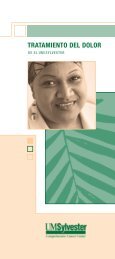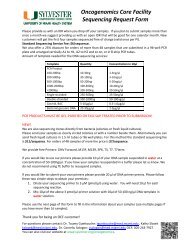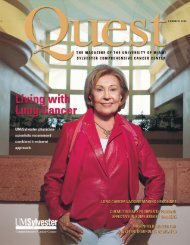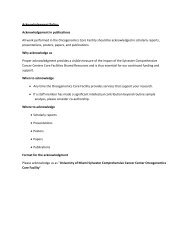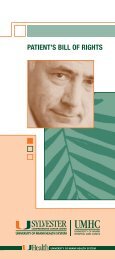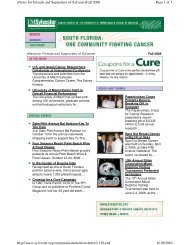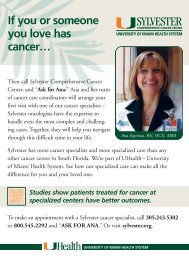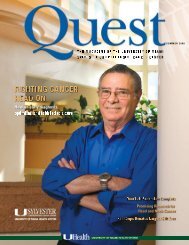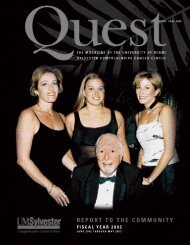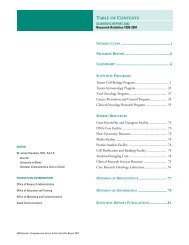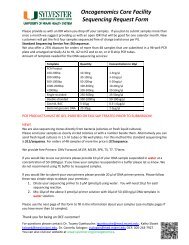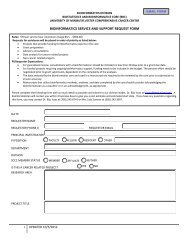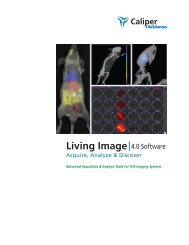SCIENTIFIC REPORT 2004 - Sylvester Comprehensive Cancer Center
SCIENTIFIC REPORT 2004 - Sylvester Comprehensive Cancer Center
SCIENTIFIC REPORT 2004 - Sylvester Comprehensive Cancer Center
Create successful ePaper yourself
Turn your PDF publications into a flip-book with our unique Google optimized e-Paper software.
T U M O R I M M U N O L O G Y P R O G R A M<br />
CD80-mediated T-cell dependent anti-tumor<br />
immunity and the generation of protective immunity<br />
in animals are resistant to rechallenge. In<br />
addition, they found that constitutive expression<br />
of one or more of the cytokines IL-1α, IL-6, and<br />
GM-CSF is associated with down-modulation of<br />
CD80 co-stimulatory molecule expression in oral<br />
HNSCC cells. The HNSCC cell lines that exhibit<br />
a combination of constitutive cytokine expression<br />
and low CD80 expression also exhibit<br />
increased tumorigenic potential in immune-competent<br />
mice, as previously reported. Reduction of<br />
CD80 co-stimulatory molecule expression by<br />
pro-inflammatory cytokines IL-1α, IL-6, and<br />
GM-CSF has not been previously described. This<br />
decrease in CD80 expression during malignant<br />
progression of HNSCC may result in dysfunctional<br />
anti-tumor immunity, thereby promoting<br />
malignant growth.<br />
Studies are under way to determine the regulatory<br />
mechanisms of cytokine-induced downregulation<br />
of CD80 expression and to determine<br />
the prognostic significance of its expression on<br />
tumor specimens from patients with HNSCC.<br />
Once the role and regulation of CD80 in<br />
HNSCC are understood, CD80 expression can<br />
be up-regulated pharmacologically in new and<br />
innovative approaches to increase anti-tumor immune<br />
responses for the prevention and treatment<br />
of HNSCC.<br />
SELECTED PUBLICATIONS<br />
2002<br />
Thomas, GR, Regalado, JJ, and McClinton, M.<br />
A rare case of mucoepidermoid carcinoma of the<br />
nasal cavity. Ear, Nose, and Throat Journal<br />
81:519-22, 2002.<br />
2003<br />
Pandey, M, Chandramohan, K, Thomas, G,<br />
Mathew, A, Sebastian, P, Somanathan, T,<br />
Abraham, EK, Rajan, B, and Krishnan Nair, M.<br />
Soft tissue sarcoma of the head and neck region<br />
in adults. International Journal of Oral and Maxillofacial<br />
Surgery 32:43-48, 2003.<br />
124<br />
KHALED TOLBA, M.D.<br />
Assistant Professor of Medicine<br />
DESCRIPTION OF RESEARCH<br />
During the past five years, Dr. Tolba has been<br />
developing immunotherapeutic strategies for<br />
B-cell hematologic malignancies, with particular<br />
interest in chronic lymphocytic leukemia (CLL).<br />
CLL is the most common leukemia in the Western<br />
hemisphere. As a relatively slow-progressing<br />
tumor with readily accessible tumor cells, it offers<br />
an opportunity to develop and test immunotherapeutic<br />
interventions. A number of profound<br />
immunologic deficiencies affecting both the B-<br />
and T-cell responses, however, have posed a challenge<br />
to immune therapy of CLL.<br />
The laboratory has co-developed and<br />
adapted the use of herpes simplex virus (HSV)<br />
amplicons for gene transduction of CLL cells.<br />
Using CD40L as an effector molecule, they have<br />
shown robust induction of co-stimulatory molecules<br />
on transduced and bystander cells<br />
and in roughly one-third of tested patients<br />
demonstrated the capacity to generate cytotoxic<br />
T lymphocyte (CTL) activity. This capacity to<br />
elicit autologous CTL response, however, was not<br />
universal as more than half the patients tested<br />
failed to mount such a response in spite of adequate<br />
up-regulation of co-stimulatory signal on<br />
both transduced and bystander CLL cells. In addition<br />
to being a highly efficient gene transfer vector,<br />
herpes simplex virus (HSV)-based amplicons<br />
possess the capacity to engage and activate different<br />
elements of the innate immune system. Currently,<br />
the laboratory is studying various aspects of HSV<br />
amplicon/innate immune interaction and their<br />
influence on the outcome of an adaptive antitumor<br />
immune response.<br />
Immune therapeutic strategies targeting the<br />
innate immune system might offer an alternative<br />
pathway to bypass inherent CD8 + T-cell defects<br />
and effectively mount a systemic anti-tumor immune<br />
response. Dr. Tolba and his colleagues are<br />
exploring how HSV amplicon interacts with the<br />
family of toll-like (TL) receptors and up-regulates<br />
NKG2D ligands on target cells.<br />
UM/<strong>Sylvester</strong> <strong>Comprehensive</strong> <strong>Cancer</strong> <strong>Center</strong> Scientific Report <strong>2004</strong>



